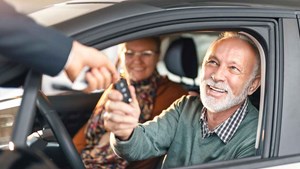How to finance buying a car
5 minute read

Buying a car is a big financial decision, but what are your payment options? Age Co explains the difference between HP and PCP and more in this guide.

Get Car Insurance
Age Co helps drivers over 50 find the right protection. We are 100% owned by Age UK and our profits go back to the charity.
What is the best way to buy a car?
While there are many ways to buy a car, the ‘best’ way is likely to differ from person to person, depending on their financial situation but also other circumstances, such as their credit score.
Firstly, you'll want to shop around various providers, such as:
- Private dealerships
- Adverts in local papers
- Auction sites, such as eBay
Private sellers
These last two - advertisements and auction sites - can be good options for those looking for a second-hand car at a cost-effective price. This is because they're typically used by private sellers. Some people prefer using a private seller, not only for the price but also because many cars can be found locally, allowing you to view them yourself at your own convenience.
But don’t forget that private sellers won’t be able to provide finance options - they usually require you to pay the whole amount upfront and in cash. While sometimes this can be a good option as it erases the matter of interest, it can be a slightly riskier way of buying a car (due to the lack of Buyer Protection) and many will want to spread the cost out over a period of time.
Dealerships
Due to the financing options they provide, dealerships remain the most popular way to buy new or used cars. While dealers still accept cash, you also have the option to pay a monthly fee over a set number of months or years. But even with this option, there are still a couple of finance options available.
Hire Purchase (HP)
The first is known as hire purchase (HP). This is where you put down a deposit (usually around 10 per cent) and then a loan is taken out against the remaining cost of the car. The loan is paid back monthly for a specified amount of time and once the last payment has been made, the car is officially owned by you. The time period for HP is usually three years but some dealerships may offer loans for a five year period.
The second is known as personal contract purchase (PCP).
How does PCP work when buying a car?
This kind of financial agreement is similar to hire purchase (HP), except you don’t own the car at the end of the contract. Instead, you can trade the car in for another model, give it back altogether or pay a final balance which means you can own the car and keep it for as long as you wish.
While monthly PCP payments tend to be lower than HP, which makes it a more desirable option for some, you won’t automatically own the car at the end and may be stuck with a large balloon payment. You may also be required to pay an additional fee if you go over the specified mileage allowance or to cover general wear and tear. However, it can be a good option if your annual mileage is low and you wish to switch cars regularly.
What is a balloon payment?
A balloon payment (sometimes also called 'optional final payment') is the amount you can pay at the end of a PCP contract to take full ownership of your car. A figure is usually calculated at the start of your contract, based on the deposit you're paying, how much you'll contribute monthly, and the vehicle's estimated future value. You'll find the balloon payment is essentially the value difference between what your car was worth at the start of the contract versus the end.
Example of a balloon payment
- You decide to finance a car which costs £60,000
- You are offered a 36-month contract at 0% interest* and a £15,000 deposit
- The expected value of the car after 36 months is £30,000
- Your monthly payments will be £417
Purchase Price
£ 60,000
Deposit
£-15,000
36 Monthly Payments
£-15,000
Balloon Payment
£-30,000
At the end of the contract, you'll be able to choose between giving the car back to the dealership OR paying the £30,000 balloon payment to take ownership of the car.
*Please note: We have used 0% interest to help clarify the figures in our example. However, most finance options will charge a higher rate of interest.
With either HP or PCP, the bigger the deposit you can put down, the better, as it means you’ll be paying less each month and there’ll be a lower amount of interest. Alternatively, you could keep monthly repayments the same and instead reduce the amount of time of the contract.
Can I buy a car with no down payment?
You can purchase a car with no upfront payment. However, you should be wary of doing this. When you don’t pay a deposit, the monthly repayments can be higher and you’ll be paying much more interest than if you put a small amount down. Ideally, it’s something you should avoid where possible.
You can, of course, purchase a car outright with no need for a deposit or monthly payments.

Can the government help me buy a car?
If you regularly receive benefits, such as the higher rate Disability Living Allowance, you may be eligible for a mobility car. These cars allow you to exchange your monthly payments for a car, and in some cases cover the full cost of the vehicle. It would be worth looking into further and doing some research to see if you qualify, as it could allow your vehicle to be paid for you.
The government also used to offer a grant to help people purchase electric cars and plug-in hybrids. However, this is no longer available, having been discontinued in April 2022. Grants for electric vans and motorbikes are still available.
Summary
Looking to purchase a new car? If so, consider these key points from our guide:
- Private car sales can offer cost-effective options for second-hand cars. However, it will lack financial protection and you need to make a lump sum payment.
- Dealerships can offer some financial protection, such as warranties. They can also offer two finance options - hire purchase (HP) and personal contract purchase (PCP).
- Hire purchase means you put down a deposit and then a loan is taken out against the remaining cost. Once the loan has been repaid, the car is officially owned by you.
- A personal contract purchase (PCP) is like a long-term rental. You will often pay a deposit and make monthly payments but will agree to return the car when the contract ends.

Sign up to the Age Co Newsletter
Each month, our email newsletter delivers inspiring stories, practical guides to later life, plus the latest news about Age Co and the charitable work we support.
